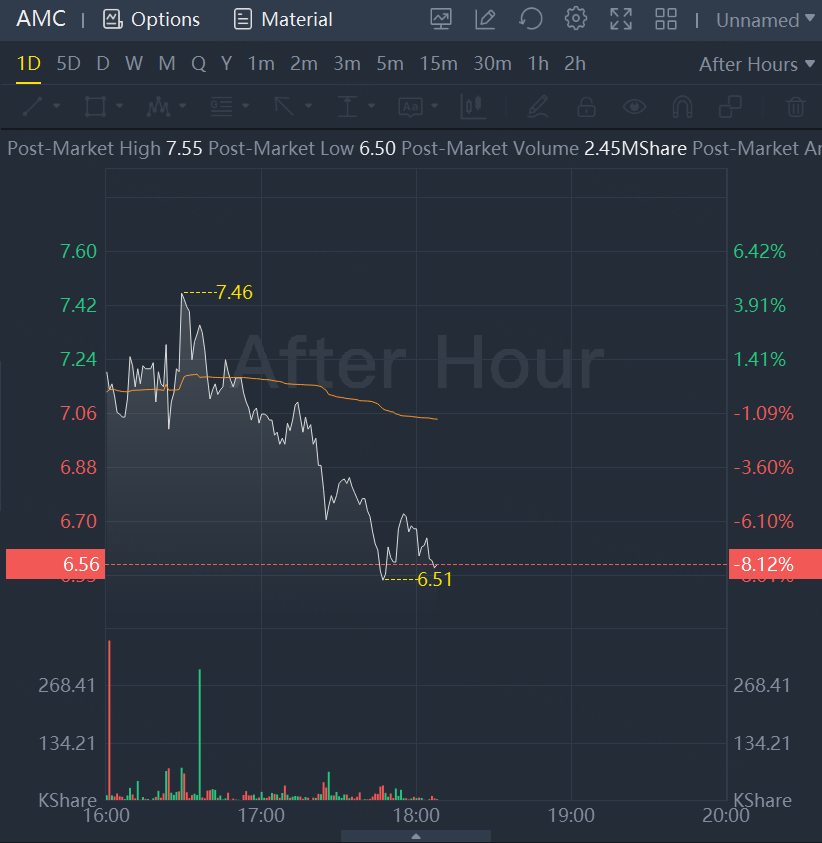AMC Entertainment Holdings Inc. reported a loss for a 14th consecutive quarter and fourth consecutive year Tuesday, and shares fell in after-hours trading.
The movie-theater chain and meme-stock phenomenon topped Wall Street's reduced targets for the holiday quarter, reporting a net loss of $287.7 million, or 26 cents a share, compared with a net loss of 13 cents a share in the same period last year. On an adjusted basis, AMC $(AMC)$ reported a net loss of 14 cents a share, worse than a loss of 6 cents a share last year. The company has not reported a profitable quarter on a GAAP basis since nearly a year before the pandemic, in the second quarter of 2019, and has not been profitable for a full year since 2018.
AMC reported fourth-quarter sales of $990.9 million, compared with $1.18 billion in the same period last year. Analysts surveyed by FactSet were looking for sales of $978 million and a net loss of 19 cents a share on an adjusted basis, after reducing those targets repeatedly -- revenue was expected to be $1.11 billion as of the end of January, and more than $1.3 billion as recently as last August. For the full year, AMC recorded a loss of $973.6 million, or 93 cents a share, on sales of $3.91 billion.
The company's stock initially gained in after-hours trading Tuesday following the release of the results, but then fell 9.8% in the extended session. Shares of the meme-stock darling closed with a 6.2% decline at $7.14, and have fallen 38.4% in the past 12 months. The stock hit a 52-week high of $21.09 on March 29, 2022.
"With more major movies coming in 2023, we are highly confident that our multiyear recovery will continue to show considerable progress this year," Chief Executive Adam Aron said in a statement. "But we cannot stress enough how crucial it is that for AMC to remain viable, we must continue to be agile and nimble not only in running our business day to day, but also in our continued raising of cash and decreasing the debt load on AMC Entertainment."
AMC executives did not provide a financial forecast, though Aron noted that "the first-quarter domestic box office already has posted an impressive 44% increase over 2022," while admitting again that "the industrywide box office will not return to prepandemic norms before 2024 or 2025 at the earliest."
The movie-theater chain has had a busy few months. December saw the eagerly-anticipated opening of Walt Disney Co.'s $(DIS)$ "Avatar: The Way of Water," which has become one of the five highest-grossing movies of all time at the box office
AMC announced in January a special meeting of shareholders to increase the number of AMC authorized shares from just over 524 million to 550 million and authorize a 1-for-10 reverse split of the company's common stock, converting AMC Preferred Equity units into shares of common stock. The move is part of the company's ongoing battle to eliminate debt, but has been held up by court proceedings that contributed to a big swing in AMC and APE stocks Monday.
The company's APEs made their trading debut in August. With its APE equity unit, AMC created something like a 2-for-1 stock split, marking the company's latest effort in a fight over stock issuances. The name is a nod to the investors who turned the company into a meme stock, who often refer to themselves as "apes" or "ape nation."
This month, AMC announced that it has repurchased $365 million of debt since the beginning of 2022 and rolled out movie-ticket pricing determined by seat location.
Before market open Tuesday AMC announced a popcorn collaboration with Walmart Inc. $(WMT)$. The movie-theater chain said the microwave and ready-to-eat popcorn will be available at hundreds of Walmart locations staring March 11.
Over the past two years, AMC has been on a roller-coaster ride that took it from beleaguered pandemic victim to meme-stock phenomenon. AMC used the steep rise in its share price to tap into equity and debt markets, raising $917 million in January 2021. AMC ended the quarter with $842.7 million of liquidity.


